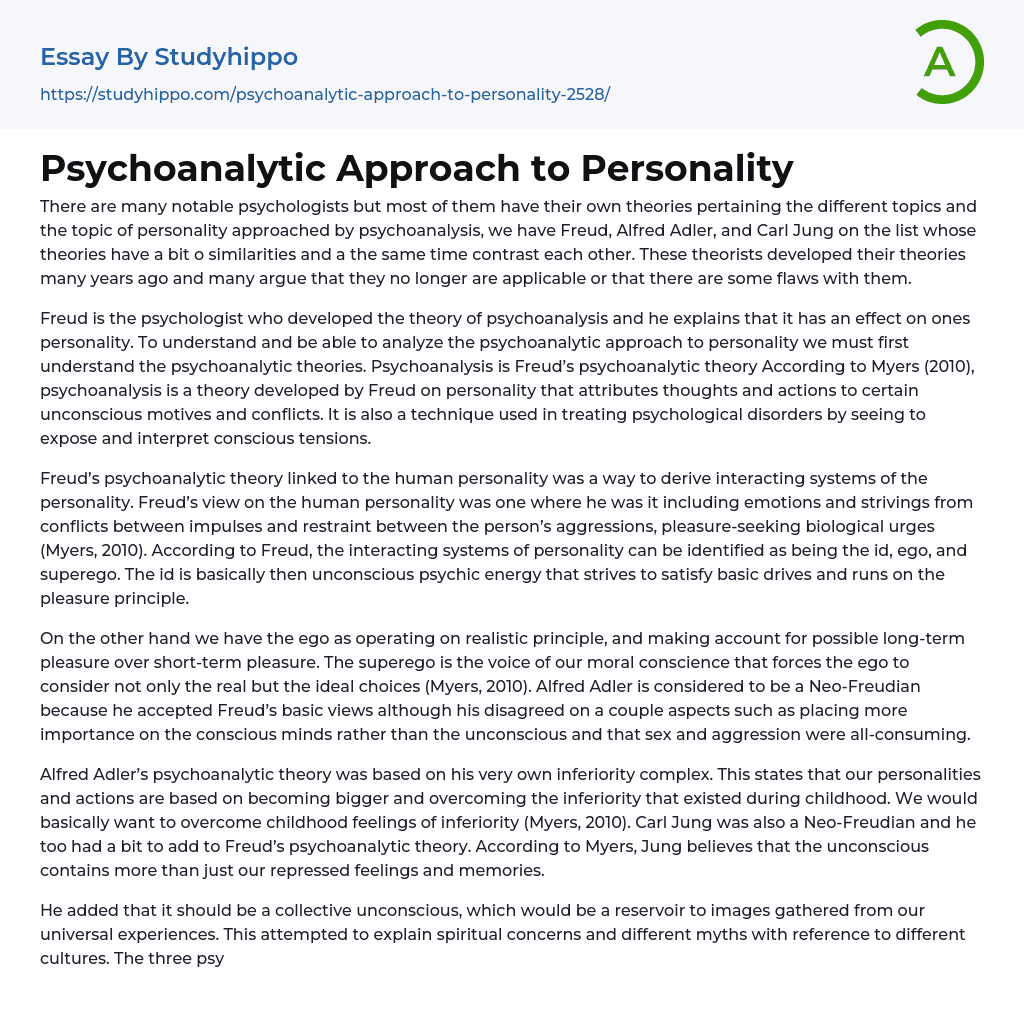Freud, Alfred Adler, and Carl Jung are notable psychologists known for their theories on personality and psychoanalysis. While these theories have similarities, they also have contrasting perspectives. Some critics argue that these theories are no longer applicable or flawed, despite being developed many years ago.
Freud's theory of psychoanalysis is well-known for its influence on personality. To fully comprehend the psychoanalytic approach to personality, a solid understanding of Freud's theories is necessary. According to Myers (2010), psychoanalysis attributes thoughts and actions to unconscious motives and conflicts.
It is also a technique used in treating psychological disorders by seeking to expose and interpret conscious tensions. Freud’s psychoanalytic theory is linked to the human personality, deriving interacting systems of the personality. According to Freud, the human personality includes emotions and strivings arising from conflicts between impulses and restraints
..., such as the person’s aggressions and pleasure-seeking biological urges (Myers, 2010). Freud identifies the interacting systems of personality as the id, ego, and superego. The id represents unconscious psychic energy that strives to satisfy basic drives and operates on the pleasure principle. In contrast, the ego operates on realistic principles, accounting for possible long-term pleasure over short-term pleasure.
The superego is the moral conscience that makes the ego consider both real and ideal choices (Myers, 2010). Alfred Adler, a Neo-Freudian, shared Freud's basic views but diverged on certain aspects such as emphasizing the conscious mind over the unconscious and rejecting the notion that sex and aggression dominate our lives. Adler's psychoanalytic theory revolved around his concept of the inferiority complex, which suggests that our personalities and behavior stem from our efforts to overcome feelings of inferiority experienced during childhood.
Myers (2010) states that
the objective is to conquer childhood feelings of inferiority. In addition, Carl Jung, a Neo-Freudian, contributed to Freud's psychoanalytic theory by proposing the existence of a collective unconscious. This collective unconscious contains images derived from our universal experiences and coexists with repressed feelings and memories in the unconscious mind.
This text discusses the attempt to explain spiritual concerns and different myths, with references to various cultures. The three psychoanalytic theories are derived from Freud's original theory, but both Jung and Adler have added their own concepts while rejecting the notion of sex and aggression dominantly governing them. From these theories, I concur with two characteristics pertaining to Freud's perspective on the structure of personality, namely the id, ego, and superego. I find myself believing in and observing these components regularly, especially when in the company of young children. Additionally, I also agree with Adler's notion of the inferiority complex.
This theory appears to have solid support since it was personally developed by Jung himself. However, there are two points that I find disagreement with. First, I struggle to comprehend Jung's notion of the collective reservoir of memories as the unconscious. To me, the unconscious is a realm of unknown aspects, and I fail to see how our memories are stored there. Secondly, I do not agree with Jung's endeavor to explain inherited experiences.
Freud's psychoanalytic theory encompasses five stages, namely the oral stage, anal stage, phallic stage, latency stage, and genital stage. These stages are determined by the child's growth and development. The oral stage occurs from birth to 18 months and centers on the satisfaction of the mouth's pleasure through activities such as sucking, biting, and chewing.
From 18 months to 36 months, the anal stage focuses on bowel and bladder elimination and dealing with issues of control.
The phallic stage, which occurs from 3 years old to 6 years, pertains to the pleasure zone being the genitals and the management of incestuous sexual feelings. Following this is the latency stage, spanning from 6 years to puberty, which primarily centers around dormant sexual feelings. The final stage is the genital stage, commencing at puberty and beyond. It emphasizes the development of sexual interests (Myers, 2010).
Freud introduced defense mechanisms to combat anxiety, which include repression, regression, reaction formation, projection, and rationalization. Among these mechanisms, three will be examined: rationalization, regression, and projection. Rationalization encompasses the justification of actions and their outcomes. For instance, a student failing a course may employ rationalization by attributing the failure to the teacher having a personal vendetta against them. Regression involves reverting to an earlier stage of development.
An example of projection is when a college student at college feels homesick and yearns for the comfort of their own home. Similarly, a liar is constantly vigilant because they believe that everyone else is also a liar. These psychoanalytic theories serve as the foundation for understanding personality. Freud's id, ego, and superego shed light on an individual's personality and their behavior based on the system they employ. Adler's inferiority complex influences personality development by striving to overcome feelings of inferiority from childhood.
According to Jung's theory, the collective unconscious plays a significant role in shaping our personality. However, it also acknowledges the existence of various approaches for comprehending personality. The book "Psychology" by Myers, D.G. can be referred to for further information
on this topic.
New York: Worth Publishers.
- Attitude essays
- Goals essays
- Personal Goals essays
- Personal Life essays
- Personality essays
- Principles essays
- Reputation essays
- Self Awareness essays
- Self Esteem essays
- Self Reflection essays
- Self Reliance essays
- Strengths essays
- Value essays
- Values essays
- Weakness essays
- Who Am I essays
- Abnormal Psychology essays
- Abraham Maslow essays
- Attachment Theory essays
- Authority essays
- Behaviorism essays
- Classical Conditioning essays
- Cognitive Psychology essays
- Counseling essays
- Developmental Psychology essays
- Educational Psychology essays
- Erik Erikson essays
- Family Therapy essays
- Jean Piaget essays
- Maslow's Hierarchy Of Needs essays
- Mental Health essays
- Operant Conditioning essays
- Personality Psychology essays
- Positive Psychology essays
- Psychoanalysis essays
- Psychotherapy essays
- Sigmund Freud essays
- Social Psychology essays
- Stanford Prison Experiment essays
- Supersize Me essays
- Unconscious Mind essays




